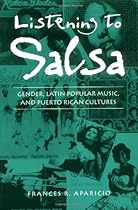Read Listening to Salsa: Gender, Latin Popular Music, and Puerto Rican Cultures (Music/Culture) by Frances R. Aparicio Online
Read [Frances R. Aparicio Book] * Listening to Salsa: Gender, Latin Popular Music, and Puerto Rican Cultures (Music/Culture) Online * PDF eBook or Kindle ePUB free. Listening to Salsa: Gender, Latin Popular Music, and Puerto Rican Cultures (Music/Culture) For Anglos, the pulsing beats of salsa, merengue, and bolero are a compelling expression of Latino/a culture, but few outsiders comprehend the music's implications in larger social terms. Frances R. What results is a comprehensive view "that deploys both musical and literary texts as equally significant cultural voices in exploring larger questions about the power of discourse, gender relations, intercultural desire, race, ethnicity, and class.". She offers a detailed genealogy of Afro-Caribbean

| Title | : | Listening to Salsa: Gender, Latin Popular Music, and Puerto Rican Cultures (Music/Culture) |
| Author | : | |
| Rating | : | 4.54 (613 Votes) |
| Asin | : | 0819563080 |
| Format Type | : | paperback |
| Number of Pages | : | 302 Pages |
| Publish Date | : | 2016-09-28 |
| Language | : | English |
Marcos said Uses social commentary from other sources to analyze salsa while failing to analyze the musical concepts. I strongly disagree with the other reviewers. Some research was done in writing this book, but the writer lacks in depth knowledge of salsa culture. Also too much analysis is drawn from other genres such as the bolero, danza and plena and the conclusions applied to salsa too liberally.The author is happy to mention that black innovators Ismael Rivera and Cortijo they pushed black Puerto Rican culture into every household in the island. But rather than rejoice in this success, she destroys it by commenting that the contributions of light skin. A Customer said An excellent book that will cause salseros pause. Frances Aparicio's work is a powerful blend of critical analysis of lyrics, styles of performance, and ethnography on the reception of listeners to salsa's meanings. She relies on an obvious and powerful training in literary analysis to consider the history and multiple uses of salsa as a form of expression, communication, and community formation. However, the most important contribution of this work is its concentration on gender and on the ways in which desire, identity and language are negotiatied upon music. It is clear that years of res. "Excellent Diacritical Analysis, exploration and discussion." according to Juan Vargas. Aparicio presents a thorough understanding of what she speaks, she states she comes from academia, so there should be no illusions. I have been started my own journey into discovering the roots and makeup of all Latin and Portuguese music since Colonial times, She dares to take a brave new look at the topic from a class-struggle perspective, from the anti-feminist perspective, (not likely to come from a male writer). She stated that salsa had its roots in Cuba. I think some people don't want to hear the truth of Machismo, and the belittling
For Anglos, the pulsing beats of salsa, merengue, and bolero are a compelling expression of Latino/a culture, but few outsiders comprehend the music's implications in larger social terms. Frances R. What results is a comprehensive view "that deploys both musical and literary texts as equally significant cultural voices in exploring larger questions about the power of discourse, gender relations, intercultural desire, race, ethnicity, and class.". She offers a detailed genealogy of Afro-Caribbean music in Puerto Rico, comparing it to selected Puerto Rican literary texts, then looks both at how Latinos/as in the US have used salsa to reaffirm their cultural identities and how Anglos have eroticized and depoliticized it in their adaptations.Aparicio's detailed examination of lyrics shows how these songs articulate issues of gender, desire, and conflict, and her i
Aparicio analyzes salsa, boleros, and other popular musical forms in terms of cultural issues (race, gender, class), drawing on her own experiences, and those of typical listeners, to explore these issues. . The accessible writing style and lavish use of illustrations help achieve the authors' goal of inspiring interest in this music. A recommended choice for academic Hispanic studies collections and for music collections with a strong Hispanic emphasis. Updates cover recent music and musicians, provide more social analysis, and expand the discography to 1000 titles, adding much to the original edition. From Library Journal Two new books on popular music present contrasting approaches to the diverse world of Hispanic music. McGowan and Pessanha here update their original edition (Billboard Bks., 1991), bringing th
Download Listening to Salsa: Gender, Latin Popular Music, and Puerto Rican Cultures (Music/Culture)
Download as PDF : Click Here
Download as DOC : Click Here
Download as RTF : Click Here
